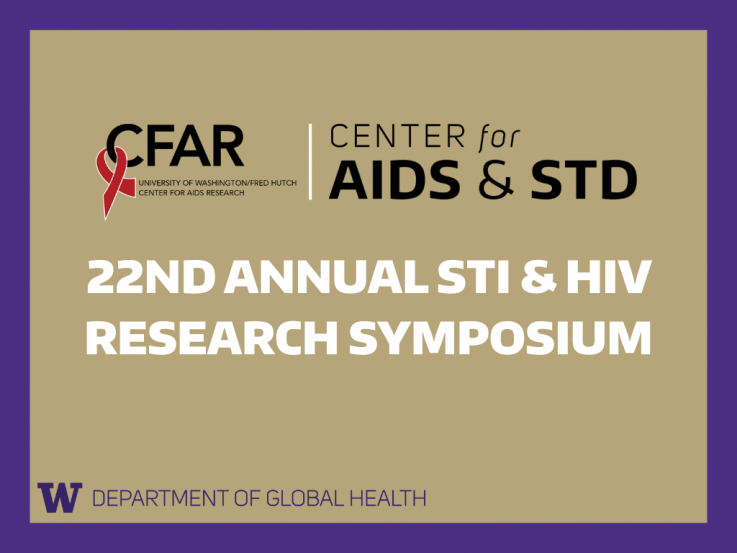Date: Wednesday, October 29, 2025
Time: 9:00am - 4:40pm | Gregorio Millett's keynote presentation from 9:05am – 10:05am
Location: Harborview Research & Training (R&T) Building, 300 9th Ave, Seattle, WA 98104 (Google Map) or via Zoom
Breakfast & lunch will be provided.
RSVP | Learn More | Download Agenda
This week, the UW/Fred Hutch Center for AIDS Research (CFAR) and UW Center for AIDS & STD (CFAS) are hosting their premier showcase — the 22nd Annual STI & HIV Research Symposium — featuring emerging HIV and STI research talent. Researchers of all career stages, practitioners, and community are invited to participate, celebrate the work being done within our community, and discuss pressing issues in the field amidst rapid policy change and funding uncertainty.
Each year, the symposium hosts a variety of talks including a keynote, panels, and poster sessions. Additionally, recipients of developmental awards from STI & HIV research and training programs at the UW, including the CFAR New Investigator Award (NIA) and STD/AIDS Research Training Fellowship Program, share updates and findings from their projects.
DGH faculty Dr. Kenneth Sherr and Dr. Kenneth Mugwanya will be participating in a panel focused on the current state of public health research and practice. Other DGH participants include Dr. Irene Njuguna, Dr. Katrina Ortblad, Dr. Jillian Neary, and Irene Cruz Talavera who will be presenting research talks. The full agenda can be viewed here.

Gregorio (Greg) Millett, Vice President and Director of Public Policy at the Foundation for AIDS Research (amfAR), will be this year’s keynote speaker. Please join us for his talk, “Public Health, Science and Public Policy: Navigating Turbulent Times” from 9:05 a.m. – 10:05 a.m. PDT on Wednesday, October 29, 2025. A prominent epidemiologist and researcher, Greg is a nationally recognized leader in health access research with significant experience working at the highest levels of HIV policy development. Greg was formerly a Senior Scientist with the Centers for Disease Control and Prevention and a Senior Policy Advisor in the White House Domestic Policy Council where he worked as one of three principal writers of President Obama’s original National HIV/AIDS Strategy.
We connected with Greg ahead of the symposium to learn more about key priorities during this shifting landscape of HIV and STI research, policy, and practice, and communicating the value of HIV and STI work.
With diminishing resources, what should our top 2 priorities be?
- "Protect HIV/STD budgets. Modeling analyses show what happens when prevention funding is taken away. We released an analysis in April showing what a 100% cut to HIV prevention funding would mean in terms of transmissions and prevalence by 2030, and another recent analysis headed by Emory showing that modest reductions in PrEP annually can lead to an increase in new HIV infections over 10 a ten-year span. Similar modeling analyses need to be completed for STI services, as well as the cross-pollination of STD, HIV, and Hepatitis C programming in reducing disease burden."
- "Ensuring access to the latest tools in the HIV/STD toolbox: Reduce barriers to injectable PrEP (Lenacapavir) or Doxy-PEP (for approved populations)."
What messaging regarding the value of HIV/STI programs resonates with the general public?
- "'HIV research benefits us all' resonates with policymakers as well as the public. Show influencers, policymakers, journalists infographics or synopses of studies that show the ways that HIV research has influenced innovation in treating leukemia, Hepatitis B, and developments in immunological prophylaxis research for other diseases."
- "'STI services save lives': STI contact tracing has saved people from infertility due to untreated STDs. STI contact tracing at local health departments have also alerted public health officials of early HIV and Hepatitis C outbreaks and have been crucial in slowing the 2022 mpox outbreak. Without these programs and services, we are at risk of failing to prevent or stem future outbreaks."
- “'New bedfellows: The opioid and syphilis epidemics': In 2000, our country was on the cusp of eliminating syphilis, but years of progress began to be erased by changes in sexual practices as well as the growth of the opioid epidemic. Among the largest increase in STIs nationally have been babies born with syphilis. We can’t cut STI funding at a time when we’re facing a crisis; we need to increase funding to address and eliminate STIs like syphilis."
"I explicitly address both of these questions in my talk. Stay tuned."
